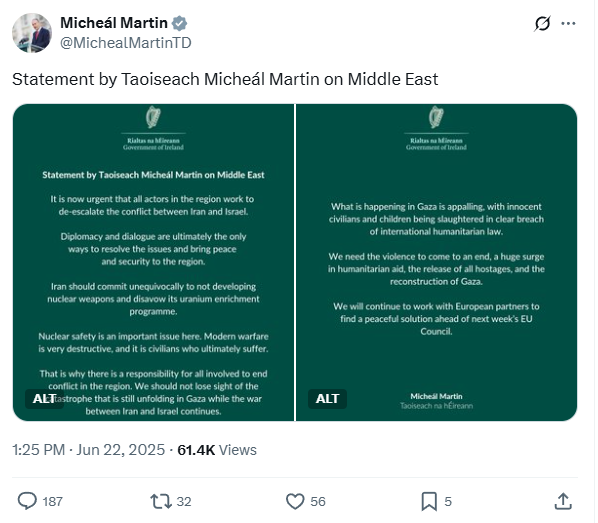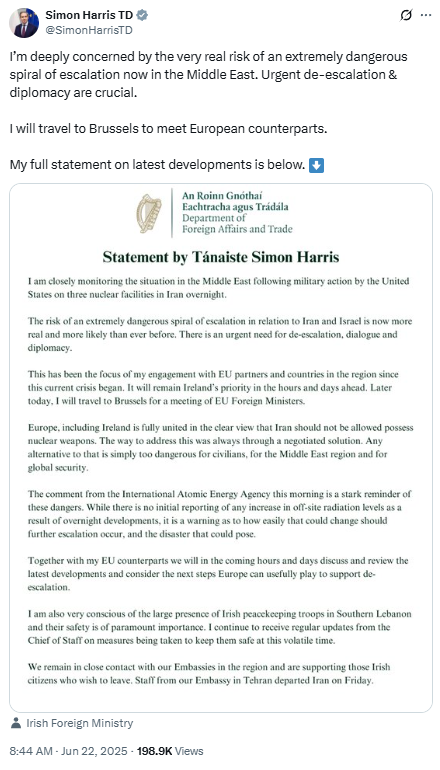There is, we can say, likely one thing that unites the headquarters of the Israeli Defence Forces; the much-depleted Politburo that presides over Hamas; the thoughts of the Supreme Leader of the Islamic Republic of Iran; and the top brass at the Pentagon in Washington: For all of their differences, none of these bodies will be guided, one way or another, by the statements on the Middle East that now appear to issue almost hourly from Micheál Martin and Simon Harris.
Our double-act was at it again yesterday morning, in the aftermath of American strikes on nuclear facilities in Iran. Why issue just one statement on behalf of the Irish Government, when you could have two?


If you asked me to pick a favourite line from those statements, it would be that which issued from the mouth of the Tánaiste: “I am closely monitoring the situation in the Middle East”.
The image conjured up by that line is Simon Harris, somewhere deep in a Government facility, surrounded by a bank of screens, phones ringing constantly on the desks conveying the latest geopolitical developments to central command in Dublin. The reality? He’s watching Sky News and CNN like the rest of us. The problem is “I’ve been watching all this on telly” doesn’t have quite the same ring as “closely monitoring the situation”.
The other point here is that it doesn’t really matter whether Harris is in a bunker receiving updates from global intelligence agencies, or whether he is watching the latest on Al Jazeera: Nothing that occurs is going to shift the Irish Government’s basic position on the Middle East regardless of what new information he receives. There is nobody on the island at this stage who couldn’t recite that position by rote: Israel are the baddies, and everyone should listen to the UN, who also think Israel are the baddies, and you wouldn’t find us doing that kind of thing, now.
Now, of course the Irish Government has a right – and perhaps an obligation – to make its position clear. Ireland has a vote at the United Nations, and has to cast it, and some explanation of the reasoning behind its votes is to be expected. That is why we have a Department of Foreign Affairs in the first place.
But the Irish position on the Middle East has long since passed “making our position clear”. It has instead become a kind of bizarre national obsession. A trawl of Simon Harris’s twitter feed over the last seven days shows seven separate statements on the Middle East, either in written or spoken form, plus endless media interviews about the position of the Irish Government on the Middle East. The number of statements over the past week about the ongoing civil war in Sudan, which has claimed 150,000 lives in the same time period as the Middle Eastern conflict, is zero.
Statements from Simon Harris on his twitter feed about domestic affairs in that same time period? One: A pair of tweets mourning the death of Lord Henry Mountcharles.
Harris, in addition to being the Minister for Foreign Affairs, is also the political leader of the second largest party in the Government. Yet over the past week there has been nothing from him on housing, nothing from him on health, nothing from him on crime, or immigration, or rising food prices, or farming issues. Almost 70% of his public statements in the last week directly reference a conflict in the Middle East to which this country is not a party, or participant, and in which we have few if any readily identifiable national interests at stake.
Nor should we delude ourselves that Irish statements on the conflict are achieving any kind of political goals either at home or abroad. At home, the Irish Government seems determined to appease the Palestinian-scarf wearing zealots whose devotion to that particular cause is quasi-religious – but it is failing to do so. All the condemnations of Israel in the world didn’t prevent Micheál Martin’s office being graffiti’d with “Zionist” last week. There is nothing the Irish Government will ever be able to do that will appease that crowd.
And internationally? The Government has set great store by its long running campaign to have the European Union explore punitive trade measures against the Israelis. Just when that campaign seemed to be getting somewhere, the conflict with Iran started and European President Von Der Leyen publicly re-affirmed Europe’s rhetorical allegiance to Israel, over the head of spluttering objections from some Irish MEPS.
Why is this happening? I’ll offer you a theory.
Simon Harris and Micheál Martin’s greatest political days – their greatest political successes – have all come in the field of what we might call “moral leadership”. None of them, not one, have come in the field of administrative leadership.
Micheál Martin’s biggest political legacy? The smoking ban. Taking a moral stand. His other victories? European referenda, the marriage referendum, the abortion referendum. All of these came in the field of politics where the ultimate question is “what makes us better people”. For Simon Harris, double that: He has essentially no record in politics outside of taking moral stances on things.
Ask these two to build a children’s hospital, and they are lost. Ask them to provide a kind of quasi-religious statement on assisted dying or whether divorce should be permitted after six months of separation, and they are in their element. The two of them see politics as much more of a Priestly job than an executive job: That’s one major reason why Irish politics is obsessed with moral questions but terrible at building houses.
The Middle East is the ultimate opportunity to export Irish moral preening to the international stage. Harris and Martin are so convinced by the Irish media of their own status as moral leaders that they genuinely believe their calling is to make statements as if they were Popes of Rome rather than Irish administrators.
For as long as we tolerate this, expect it to continue: There’s a direct link between endless Irish statements on the Middle East, and the Irish housing crisis. We’ve elected people who think of themselves as spiritual advisors, not administrators.